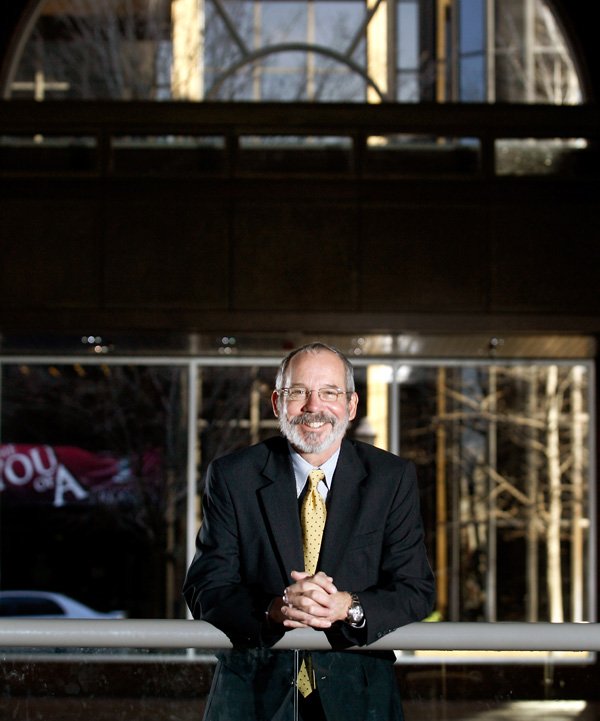FAYETTEVILLE — Randy Dixon went to work for KATV-TV, Channel 7, in Little Rock when he was 19 years old, hired by former news director Jim Pitcock.
It was 1979, and the station was making the transition from film to videotape. Dixon understood the new technology better than most. Pitcock was convinced that transferring the material to three-quarter-inch VHS tape would allow the station to reuse the older footage with current stories.
The video library turned out to be a bonanza of Arkansas history.
“You had the ’50s, the ’60s, the ’70s news film, so you have early [Dale] Bumpers, early [David] Pryor, [J. William] Fulbright, [Wilbur] Mills, [John] McClellan - all these big figures in Arkansas politics and Arkansas Razorbacks sports,” said Dixon.
In the mid-’90s, Dixon, then news director, was giving Pryor a tour of the station and all the footage it had amassed.
“He was very impressed with the archives and everything you could find in there,and with how easy it was to find in there, the way it was logged and stored,” recalled Dixon on this third day as the new director of the Pryor Center for Arkansas Oral and Visual History at the University of Arkansas.
He was hired after a nationwide director search that yielded some 20 qualified candidates, said Judy Schwab, associate vice chancellor for administration.
Dixon’s experience as news director at Channel 7 and “a real understanding of how news becomes history,” made him the winning candidate, she said.
“I like the idea of preserving Arkansas history,” Dixon said. “I think it’s a great fit because I spent more than three decades covering Arkansas news, which I guess you’d consider Arkansas history. And now I have the opportunity to preserve that history and record history.”
Pryor, a former U.S. senator, and his wife, Barbara, founded the Pryor Center in 1999 with $220,000 in leftover campaign money. Then a $2 million gift from the Don Tyson family helped expand the center’s staff andbuy additional equipment. In 14 years, the staff has compiled hundreds of interviews from people who witnessed historic events from all over the state.
In 2009, KATV donated 26,000 tapes for preservation with the Pryor Center, though they’re being held at the basement of the Arkansas State Library in downtown Little Rock, which co-owns the collection, Dixon says.
He left the television station about two years ago to start his own company, and KATV became a client, with Dixon’s duties including digitizing the older videotapes.
“I’ve been assessing the collection of what’s most valuable and most in danger of [being lost],” Dixon said.
“I knew a lot of what was in there because I was there. I started at Channel 7 when they were on tape No. 9, so I was there up to 26,000.”
Some of the more interesting news items he came across: film of the second annual Hope Watermelon Festival in 1927, an old silent black-and-white film of the floats being pulled by horses; the Warren Pink Tomato Festival from 1936; old Highway Department films from the 1950s; a 1934 film promoting the city of Little Rock. Many of the snippets were borrowed from residents and then dubbed for safekeeping.
Dixon, recently remarried and the father of two young daughters, is relocating to Fayetteville from LittleRock. His job as director of the Pryor Center is taking him to a new workplace, as well. The center will eventually be relocated from its spot on the fourth floor of Mullins Library to East Square Plaza, formerly known as the Bank of America building, on the east side of the Fayetteville Square.
Dixon’s duties are to oversee the entire operation of the Pryor Center, but also to keep it on its mission, which is to collect and record Arkansas history. To that end, the center is in the planning stages of developing a Story Bus, a high-defintion mobile television studio, much like National Public Radio’s StoryCorps travel trailer, though StoryCorps records only audio.
David Pryor is a member of the Corporation for Public Broadcasting’s board of directors, which oversees NPR.
“Every Arkansan has a story to tell,” Dixon said. “In all my travels around the state with Channel 7, I don’t think I’ve ever met a person who didn’t have some interesting story to tell.”
The goal is to take the Story Bus to 10 communities a year, Schwab said.
“There will be some interviews that may be scheduled ahead of time, but it will give schoolchildren or members of the community to come in, be recorded and have their transcript and video become the archives of Pryor Center,” she said.
The cost is estimated at between $200,000 and $400,000, all of which will be paid for with private support, she said.
Northwest Arkansas, Pages 7 on 01/19/2013

